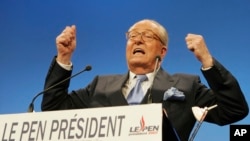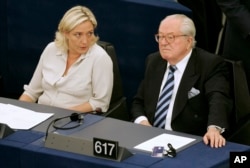Praise and sharp criticism are flooding in for far-right French leader Jean-Marie Le Pen, who died Tuesday at the age of 96. A pugnacious veteran of the colonial wars, Le Pen was a five-time presidential candidate who helped to shape the rising power of Europe’s far right.
Members of Le Pen’s far-right party — originally called the National Front and since renamed the National Rally by his daughter Marine — described him as a courageous visionary who has always served France.
Other politicians were less complimentary. Centrist President Emmanuel Macron sent his condolences to Le Pen’s family and said Le Pen would be judged by history. Far-left politicians denounced Le Pen for his anti-immigrant, anti-Muslim, antisemitic stances.
A veteran of two French colonial wars, Le Pen founded the National Front in 1972. His Paris apartment was bombed four years later.
Le Pen shocked the nation — still traumatized by its World War II past — by calling Nazi gas chambers a “detail” in French history. He was later tried and fined.
In 2002, Le Pen placed second in the first round of French presidential elections — shocking France, and the world.
Front-runner and incumbent President Jacques Chirac made an appeal against extremism. It worked. Chirac won the runoff with more than 80% of the vote.
Daughter Marine Le Pen took over the party in 2011. She launched a major makeover to soften its racist image and make it more aligned with common working-class issues.
The two Le Pens feuded, and in 2015, Jean-Marie Le Pen was ousted from the party he founded. Later, father and daughter drew closer.
Analysts say Le Pen has left a broader mark on Europe — seen in the far right’s rising influence in places like Austria and Germany — and in France, where the opposition National Rally is now the country’s most powerful party.





